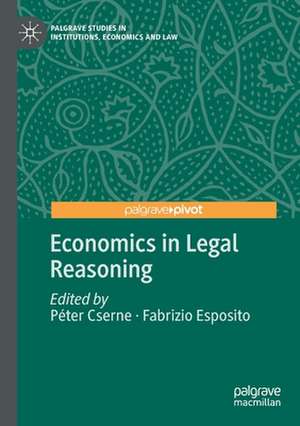Economics in Legal Reasoning: Palgrave Studies in Institutions, Economics and Law
Editat de Péter Cserne, Fabrizio Espositoen Limba Engleză Paperback – iul 2021
Despite their differences, economics and legal reasoning interact in many interesting ways. This book offers a fast track to these interactions. Both supporters and critics of Law & Economics will be exposed to a yet-to-be developed area of interaction between the disciplines.
This book will be of interest to economists, legal scholars, and Law and Economics specialists, and can be used as teaching material in courses on Law & Economics and legal reasoning as well.
| Toate formatele și edițiile | Preț | Express |
|---|---|---|
| Paperback (1) | 412.51 lei 6-8 săpt. | |
| Springer International Publishing – iul 2021 | 412.51 lei 6-8 săpt. | |
| Hardback (1) | 419.43 lei 6-8 săpt. | |
| Springer International Publishing – iul 2020 | 419.43 lei 6-8 săpt. |
Preț: 412.51 lei
Nou
Puncte Express: 619
Preț estimativ în valută:
78.93€ • 86.01$ • 66.51£
78.93€ • 86.01$ • 66.51£
Carte tipărită la comandă
Livrare economică 23 aprilie-07 mai
Preluare comenzi: 021 569.72.76
Specificații
ISBN-13: 9783030401702
ISBN-10: 3030401707
Pagini: 159
Ilustrații: VII, 159 p.
Dimensiuni: 148 x 210 mm
Greutate: 0.21 kg
Ediția:1st ed. 2020
Editura: Springer International Publishing
Colecția Palgrave Macmillan
Seria Palgrave Studies in Institutions, Economics and Law
Locul publicării:Cham, Switzerland
ISBN-10: 3030401707
Pagini: 159
Ilustrații: VII, 159 p.
Dimensiuni: 148 x 210 mm
Greutate: 0.21 kg
Ediția:1st ed. 2020
Editura: Springer International Publishing
Colecția Palgrave Macmillan
Seria Palgrave Studies in Institutions, Economics and Law
Locul publicării:Cham, Switzerland
Cuprins
Chapter 1. Introduction.- Part 1. Foundations.- Chapter 2. What is legal reasoning about: a jurisprudential account.- Chapter 3. Economic approaches to legal reasoning: an overview.- Part 2. Economics and Legal Interpretations.- Chapter 4. Economics in judicial decision-making: four types of situations where judges may apply economics.- Chapter 5. Characterizing economic and legal approaches to the regulation of market interactions.- Part 3. Economics and Fact-finding.- Chapter 6. What is Forensic Economics?.- Chapter 7. Why do US judges reject antitrust experts?.- Part 4. New Perspectives.- Chapter 8. Fostering the autonomy of legal reasoning through Legal Realism.- Chapter 9. Reverse engineering legal reasoning.
Notă biografică
Dr Péter Cserne is Reader in Law at Aberdeen University, Scotland, UK and an Extramural Fellow of Tilburg Law and Economics Center (TILEC), Netherlands. He has held visiting positions at Columbia University, University of Oxford, University of Genoa and University of Toronto and the Max Planck Institute in Hamburg. A lawyer and economist by training, he has published widely on legal theory, economic analysis of law, and contracts. He is the founder and convener of MetLawEcon, an international academic network for research on the foundations of Law & Economics.
Dr Fabrizio Esposito is a postdoctoral Fellow at the Université Catholique de Louvain and an Extramural Fellow at the Nova Law School, Lisbon, Portugal. Previously, he was a Postdoctoral Fellow at the Tel Aviv University, Israel, and defended his PhD thesis entitled Law and Economics United in Diversity at the European University Institute, Italy. He studies the relationship between economics, EU law, and legal theory with a particular focus on antitrust and consumer law. Fabrizio has joined Péter in the management of MetaLawEcon, an international academic network for research on the foundations of Law & Economics.
Dr Fabrizio Esposito is a postdoctoral Fellow at the Université Catholique de Louvain and an Extramural Fellow at the Nova Law School, Lisbon, Portugal. Previously, he was a Postdoctoral Fellow at the Tel Aviv University, Israel, and defended his PhD thesis entitled Law and Economics United in Diversity at the European University Institute, Italy. He studies the relationship between economics, EU law, and legal theory with a particular focus on antitrust and consumer law. Fabrizio has joined Péter in the management of MetaLawEcon, an international academic network for research on the foundations of Law & Economics.
Textul de pe ultima copertă
This Palgrave Pivot is the first book in the field of Law & Economics looking at the relationship between economics and law in legal reasoning. The book constitutes a reference point for the economic analysis of legal institutions, as legal reasoning remains the dimension of legal systems least explored by economists.
Despite their differences, economics and legal reasoning interact in many interesting ways. This book offers a fast track to these interactions. Both supporters and critics of Law & Economics will be exposed to a yet-to-be developed area of interaction between the disciplines.
Despite their differences, economics and legal reasoning interact in many interesting ways. This book offers a fast track to these interactions. Both supporters and critics of Law & Economics will be exposed to a yet-to-be developed area of interaction between the disciplines.
This book will be of interest to economists, legal scholars, and Law and Economics specialists, and can be used as teaching material in courses on Law & Economics and legal reasoning as well.
Caracteristici
Offers a concise and accessible, yet comprehensive, overview of the role economics does and could play in legal reasoning Contributions are written by scholars who have the rare set of interdisciplinary competencies needed to explore the topic of "economics in legal reasoning" Accessibility makes this book particularly apt for teaching purposes in courses on legal reasoning and on Law & Economics




